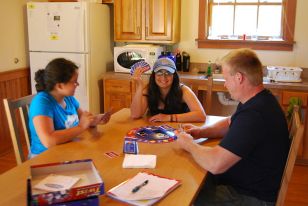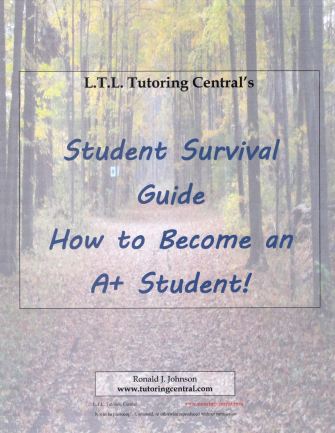Hello everyone!
My WordPress blog is now an archive. For new content, please go to:
http://www.tutoringcentral.com/Blog
Hello everyone!
My WordPress blog is now an archive. For new content, please go to:
http://www.tutoringcentral.com/Blog
Yes, writing can be fun!
The key is to find a topic that you want to write about and then jump right in. Don’t hesitate, do not pass GO, do not second guess yourself.
Make a list of your children’s interests: sports, video games, television shows, movies, superheroes, toys, etc. Encourage them to get excited about writing about their favourite topic(s).
For example, if Johnny is obsessed with transformers, he could write a review about a certain transformer. He could instructive article explaining how to manipulate the transformer. He could compare this transformer with others in his collection, and so on.
Children often want to share what they know and what they are passionate about.
Writing a blog about one’s interests is a great way to share information. Search for other  blogs or sites on the same topic. This will allow you to practise reading skills, too. Connecting with others and following their sites will increase the number of your readers and their participation.
blogs or sites on the same topic. This will allow you to practise reading skills, too. Connecting with others and following their sites will increase the number of your readers and their participation.
If you are worried about Internet security, ensure that you have the passwords and go online with your children, or monitor them. You can control the comments that come in or read them in advance of your writing time.
Don’t be too pedantic!
You don’t need to correct every spelling or punctuation mistake.
Gently make suggestions. Reword a confusing sentence as you read it, allowing your child to make the change if he or she catches your meaning.
The more your children practise writing, and of course reading other articles, the better they will become. You might even point out a few errors that other authors make that are similar to your child’s errors. The next time he or she is writing, this “correction” might be more obvious.
Of course, all of this is child dependent. If your children have no issue with proofreading and editing, you can go full throttle with doing so.
If you don’t want to blog, you can always start a journal. Part of the fun is searching for a nice book in which to keep a journal. Having said this, any scribbler or even a binder with loose-leaf sheets can serve. You can always decorate the cover yourselves!
Your children can write a journal just like a blog, or they can do a more traditional journal in which daily events, feelings, and thoughts are recorded.
If you want, you could delineate a few daily topics. For example: Write one good thing that happened, one not so good, one new experience, one funny or interesting story, etc.
Of course, you can create cartoons with text, write a short story, even begin a novel if your children are keen. I have met several students who are really challenged with writing; however, given the chance, they get very excited about writing a science fiction story or a fantasy!
Remember – look for that KEY.
Above all, you want to have fun with your creations. The whole goal of learning is to find interesting avenues into new discoveries. That’s not to say there is never any “slogging” to be done, but even that can be fun in the end when you are proud of the final accomplishment.
Tutoring can make a massive difference – especially when the tutor loves learning himself or herself and projects that enthusiasm to the student.
Free information meetings available! (Online or in-person.)

Our Rose of Sharon this year!
Website: www.tutoringcentral.com
This week’s video:
Fun Summer Learning – Writing.
There are thousands of games to play – far too many to discuss here, although I will mention a few. Don’t limit yourself! All games have at least a few teachable moments.
Note: I used the name “indoor games” simply to contrast with “sports” which I am not writing about today. Of course, you can play these games almost anywhere. Also, most of the card games and board games are available as video versions, too.
Try to choose games your children will enjoy and then find ways to incorporate learning without limiting the “fun” element. There is no need for “drills” (unless your children tend to like drills!).
Not all games have the same intellectual challenge, of course. The games you play will be determined, in part at least, by your children’s age and/or current skill level. Introduce new, different, or more challenging games as they mature. There is no need to start with something complicated. In fact, there are always times when we might enjoy playing something less challenging even when we do have the ability.
There are very useful lessons to learn around the actual playing of games. For example, learning how to lose graciously. This is not to be outdone by learning how to win graciously. Take the time to each your children that game playing is not a personal judgement of value. The real value is in connecting with others, having fun, and learning a few new things. Having learned this with game playing, they might begin to understand how this works even in the academic world. Your “results” are not “you.” (Ironically, taking that pressure off usually results in much higher marks.)
Patience and taking turns are obvious game-playing lessons. Don’t underestimate the value of the social part of game playing.
Allow your children to teach you a few tricks. One of the best ways to learn is to teach others. Not only do we retain a lot more once we have taught another, but we will engage more and want to do even more. Hey, and you will be the cool parent who knows the “Easter egg”,” method, or shortcut.
Spending time together, talking, recounting stories, relating to other activities that may or may not be related to the game, all of these are important developmental and learning points.
For math skills, games such as Cribbage or Monopoly are great choices.
Many card games have a math component – especially adding or patterning. Crazy eights, Go Fish, Euchre, Uno.
Board games involve counting (sometimes adding), patterns, making logical decisions or choices, even spelling! Scrabble, Snakes & Ladders, Trains, Chess, Checkers, Equate, Bingo, and lots more.
Reading directions to any game can be helpful. You might even be surprised when your children read the directions to you. I know many people who have been playing a game for years without realizing that they are not following the directions! (Of course, it is up to you whether or not you prefer your version of the game.) Reading directions helps you learn how to play, but you can also check back from time to time to see if there are any additional plays or allowable moves that have not been tried.
Look for reading opportunities on blogs or sites that provide commentary, reviews, or approaches to playing. These can be very interesting – not to mention helpful.
For younger children, there are lots of online games as well. Here are some reading games from PBS.
Have your children start their own blog, writing reviews of games, telling stories of particularly great (or not so great) instances while playing. They can create rating lists, include graphics, look for links or other material to incorporate. In other words, they can practise a lot of the same academic skills required in school without feeling like they are in school!
include graphics, look for links or other material to incorporate. In other words, they can practise a lot of the same academic skills required in school without feeling like they are in school!
Video games have plenty of learning opportunities. Many have story lines or the opportunity to create things like entire cities, farms, civilizations, etc. You often get to create your own characters, too! Take some time to discuss all of the interesting artifacts, methods, and potential goals.
Many of the same learning opportunities mentioned above relate to video game playing, too. Reading about the game, writing about the game, practising math skills, etc.
I am definitely not a video games expert by any stretch of the imagination. I have provide a link to some kids games that should do the trick, however.
Above all, have fun!
Remember that learning is all about fun. It will enlarge your world.
If you want some help in this regard, please get in touch.
Website: www.tutoringcentral.com
First of all, you can have fun learning anything; however, cooking is a great way to learn many lessons.
Yes, he said, “cooking!”
Letting your children cook with you is a fantastic way to teach all kinds of lessons including reading, writing, and math – not to mention how to fend for themselves later in life. (Don’t underestimate the value of this. Many adults eat fast food and poor diets because they never learned to boil an egg.)
Yes, boys should be in the kitchen, too. I was a professional cook for fourteen years, so no problem. 
You can read recipes together either in books or online. Looking for foods and recipes to try can be exciting for everyone. Having a hand in the process is a great way to get children to try different foods.
As I mentioned with the reading recipe – ah, I mean reading blog done last time, (Fun Summer Learning – Read) you can share the reading in a variety of ways, depending on the child’s age and ability.
Copying recipes from the Internet, a magazine, or other source provides a way to practise printing or writing. Using recipe cards and organizing them by meals and/or alphabetically offers more learning opportunities. Your children can create their own personal binder or box of recipes.
You could start a blog of your own and have the children add photos and text, or they could each do a blog for themselves. They could write about the recipe giving information about how easy (or difficult) it was to make. They could write about the taste and the experience of making the meal, etc. Children are naturally curious, but they also love to teach others, so this can be a gateway into expanding their horizons.
Obviously, there are math lessons to be learned when cooking. Your children can learn about measuring and weighing. You can have fun adjusting a recipe. For example, you might want only half the amount. This gives you the opportunity to work on division and/or fractions. You might want to double or triple a recipe, so multiplication skills  are practised. There are lessons around temperature and timing as well.
are practised. There are lessons around temperature and timing as well.
Related concepts include learning to follow a sequence, following directions, and ordering steps logically.
Additionally, your children will learn to express themselves orally as you discuss food, recipes, how to follow the directions, and so on. This part of learning is just as important as the more recognizable reading, writing, and math skills. Being able to express opinions, ask questions, and orally manipulate information will go a long way to helping them stay engaged and motivated to learn even more.
Yes! Mistakes will be made. Sometimes a recipe won’t work at all. Sometimes the result is edible, but – “let’s not try that one again!” Most of the time, the result won’t match the beautiful (often photo-shopped) picture. That’s fine. You will have more successes than failures, and we learn a lot from mistakes. Teach your children how to laugh, move past the errors, and use the mistake as a learning platform for the next attempt.
Have fun with it! Remember learning should be enjoyable.
Summer tutoring lessons are a great way to improve as well. Let’s get started on the learning path together.
Website: www.tutoringcentral.com

Your Path to Learning!
This weeks video: Cooking!
One of the most important activities you can do with your child at any time is to read.
Summer is an excellent time to begin (or add to) your reading schedule. You can take a book almost anywhere and e-readers let you carry thousands of books with you. Once downloaded, you don’t even need a Wi-Fi connection.
Reading a variety of materials can connect you to a whole new world either in fiction or a “new-to-you” nonfiction topic. Of course, start by choosing material that is interesting to your child. That is the best jumping board into increasing reading level, reading speed, and reading breadth in the long run.
Once someone finds the joy of reading and begins to see all the benefits, he or she will start expanding the horizons.
There is nothing better than sitting together in a room and quietly enjoying your individual books.
* Sometimes “reading” means flipping the pages and learning how to scan from left to right without actually reading. Sometimes “reading” means a lot of adult intervention to help move the story along. The important bit is that you are beginning the process to become a true reader.
This works no matter what method of reading you use because decoding and saying the words is only one piece of the true reading process.
Caution: When talking about a story or text, don’t make it into a quiz or “test” situation. Let the discussion be more organic and enjoyable.
Talk about plot (the events).
For example, how do the events relate to real life or current events?
Talk about characters.
For example what do you think about the protagonist?
Does the antagonist remind you of anyone?
Ask what would you have done in a given situation.
As you read, make predictions about what might happen next.
Ask about a character’s motive.
Talk about what the characters might be feeling.
Above all have fun!
Learning is all about fun. Not only do we learn more, but we retain the information better, when we enjoy the process.
Note: I realize that with some children reading can be a chore. Don’t worry; keep at it. Sometimes you have to endure a little struggle and less fun until you get to the ‘goods.” Stay positive and enthusiastic about reading, and you will be surprised long term.
There are loads of resources online to find suitable reading material, but here are a few.
Children’s Choices Reading List
Popular High School Reading List
Required Reading in High School
As always, I am here to help. If you would like a little extra learning practice over the long summer months, please get in touch.
Website: www.tutoringcentral.com
E-mail: tutoringcentral@inbox.com
This week’s video: Summer Tutoring! How Can I Help My Child?
Avoid the summer slide!
Note: Water slides are acceptable
You might have already heard of this. Students, particularly those that aren’t academically strong, lose a lot of ground over the summer months. A small amount of practice makes dramatic differences come September.
It doesn’t take long
A couple of hours a week is all it takes in most cases.
Remember that an hour of tutoring is often more focused than six hours of school time.
I do understand that some students are very reluctant to take part in summer learning; however, I remind them and their parents that over the two to three months of summer tutoring, with only a couple of hours a week, they will have spent 16 to 20 hours in tutoring. There are approximately 1560 hours in that same time.
So, out of 1560 hours, you spend only 16 to 20 hours at the tutor!
It is not expensive
The fees for tutoring pay off big time in results. Not only will the student do better in the fall but he or she will be set up to excel for the whole year the results are exponential.
A student who believes in himself or herself will be happier and more willing to keep trying. Who doesn’t want happiness anyway!
If you think education is expensive – try ignorance.
Summer learning is more relaxing
The pressures of school are off for the summer. There won’t be any major projects, speeches, book reports, math tests, etc. for a couple of months. I try to impress upon my students that the whole goal is to learn – not necessarily to pass a test. Just keep doing better than the last time and keep moving forward. Pay attention to the learning and the grades, when you are back at school, will take care of themselves!
Learning is elevating and tasty!
Learning new ideas and how to express them is not torture – or, at least, it shouldn’t be. (Hint: you are with the wrong tutor if it is.) We humans do better physically and emotionally when we keep learning. We are curious by nature, so we should feed that need to know. True, it sometimes takes effort and a wee bit of tedious practice, but the end result is so sweet.
Don’t hesitate
It is near! I realize that we are just now entering into May, but summer comes quickly setting up a plan now will make the transition easier. Being a consistent learner brings the best results.
Call or email to arrange online or in person tutoring lessons today.
Website: www.tutoringcentral.com
This sounds obvious enough. You can find lots of tutors online these days. Look for a tutor that will be a good fit for you or your child. When you find a potential candidate, check out his or her website, videos, blogs, etc. This will get you a feel for the tutor’s style. Of course, you want a tutor who has knowledge in your area of interest. However, finding a good fit goes beyond subject matter. You need to chat and make sure that the tutor’s personality and approach make you feel comfortable.
Allow time to chat with the tutor online. If you are going to sign up for online tutoring, you might as well practise “working” online. There are many excellent platforms that allow tutors, parents, and students to see and hear one another almost as if they are in the same room! Skype, Zoom, and BitPaper work really well. (All free to use!)
Be understanding and patient. You will want the tutor to schedule you at a time that works for you but also for him or her, so that nobody is rushed or unprepared for the chat. Every tutor is different, but I provide a minimum 30 minute free information meeting. (They are so much fun, we often run over.)
This is a perfect time to see how you can interact online through one or more of the programs that the tutor uses. For example, I show my potential clients that they can write, type, draw, share documents & videos, and share screens while we have our meeting. Of course, we can see each other through the cameras and talk just as if we were in the same room. It is truly amazing.
Small clip showing a tiny bit of the online abilities.

Ask your prepared questions. Look for a tutor who is able to answer your questions to your satisfaction. A tutor who tells you exactly what he or she is able to do and what he or she is not able to do is far more valuable than one who simply “advertises.” Everyone has limits. Also, tutors cannot guarantee a specific improvement, although they can provide you with common results or even examples of stellar results that occur occasionally. Don’t forget to ask about how lessons are delivered? What times are available? How are the lessons packaged? Is there a minimum number of lessons required? What is the cancellation policy?
I have touched on this before. Learning is not only about the abc’s and the 123’s. You want an educational coach that can relate to the student and that can motivate, encourage, and help the student reach his or her goals. Of course, if you are looking for a writing tutor or reading tutor, you want someone knowledgeable in these areas, but he or she also needs to be able to speak well enough to engage the student. He or she needs to have a rapport and, in my opinion, a sense of humour.
Patience is essential. For over twenty years I have tutored all kinds of students and patience cannot be overrated. Everyone learns differently. A tutor needs to take the time to know the student and gear the teaching style and methods to the individual, focusing on using the student’s strengths to conquer his or her weaknesses and construct a more solid foundation.

Sign up. Commit to a number of lessons. Don’t be afraid to get started. It is often this step that “trips up” the process. Like anything new, it is a bit scary – but the rewards are amazing!
Don’t be late! Try to make sure that you have the time correct – particularly if you and the tutor are in different time zones. (Of course, the tutor should aim to make this clear as well.) Please, respect the tutor’s time. Consistency is key for learning also, so try to make all scheduled lessons or reschedule within the same week if possible. The first lesson is exciting, but it can be frustrating, too. The technology is great, but it is not perfect. Allow for a few glitches and a little learning curve to get everything right. Smile. Enjoy. Your tutor will help walk you through any technical issues, but there is nothing wrong with you helping each other. The first lesson should leave you feeling comfortable, and it should provide a good start to your online tutoring experience.
The first lesson is not the whole program! Don’t expect it to suffice. Be consistent by attending all lessons. Be prepared. If you are supposed to be doing something outside of the face-to-face lessons, make sure you have completed (or at least attempted) all tasks. Write down any questions, so you don’t forget them. Turn off or reduce all distractions. If the instructor is talking to you, the session should not be interrupted constantly by irrelevant texts, calls, or other open programs. Focus on the lesson. After all, that’s why you signed on!
1. Find a tutor – research
2. Get in touch – have an online meeting
3. Ask questions
4. Feel comfortable? Register for lessons (plan for a reasonable number)
5. Enjoy the first lesson – relax, get used to the technology
6. Commit to the program – be consistent & prepared
The best point of all is that you have options that never existed before. Take advantage of them.
I hear these kinds of questions, especially from high school or university students. They feel that their writing should now “sound” more intelligent, so they add all kinds of words, clauses, and phrases that tend to do quite the opposite!
Make your writing clear. 
Make your writing concise.
Make your writing understandable
Provide support, detail, explanations, anecdotes, and so forth to help the reader understand your argument, point of view, or opinion. Spend time to fully understand your own thoughts and connections to the material so that you can write about the ideas intelligently.
These are far more important than complicating the issue.
When students, or any writers for that matter, force their writing – the quality becomes worse. Making something “sound” more complicated than it really is does not help the reader (or the teacher ) in any way.
Your ideas can be original and attractive, but they don’t need to be mired in arcane language or complicated sentence structures that lead the reader nowhere.
I have read students’ essays that aim to impress, but the writing is so convoluted that the meaning is lost. When I ask them to explain, they often say, “I’m really not sure what I meant, but doesn’t it sound good?” Their hope is that the teacher or professor will find something in that mess to admire. This is a very poor method!
Some of the best writers, in fact, make a concerted effort to ensure that their writing is as uncomplicated as possible. That does not mean “dumbing-down” (as one of my students said to me recently). It means that you are doing your job to help the reader comprehend your intentions.
It is the ideas and thoughts that are important. You want the reader to be impressed, or at least persuaded, by your argument, opinion, or description.
If the reader does not understand your work, he or she will not be impressed. (Although I have heard people say, “He must be a great writer, I couldn’t understand a word of it!”)
Work on sentence structure and grammar. Make sure you follow the basic rules and conventions of writing. Don’t think of the rules as restrictive. Recognize that they actually free the rest of your mind to be creative in thought, networking ideas, and expounding upon your take on a particular topic.
Want a place to start? Try these discount coupons, and I will help you.
Brush up on the basics and apply them well, and you will see higher grades. Better yet, the quality of your writing will continue to improve.
Of course, as you become more proficient, you might notice that your sentences are longer and more “sophisticated,” but they retain the clarity of purpose as well.
Most of all – keep writing!
As with any skill, you get better with practice, especially if you pay attention to the weak spots. Try to take on constructive advice and make the necessary adjustments to keep  improving.
improving.
For more information, lessons, and programs check out the website.
Don’t let sentence fragments weaken you!
Well – don’t let them weaken your writing which is an extension of you at least.
Last week I wrote about run-on sentences. A sentence fragment is basically the opposite of a run-on sentence. You will want to avoid both of them in your formal writing.
(Friendly letters, texts, and even fiction writing follow different conventions, but there are still times you might want to be careful in these writings as well.)
A sentence fragment is a piece of a sentence rather than a full sentence. 
For example, you might have the subject for a sentence:
“The raging bull with fierce, glowing eyes.”
This is not a sentence because there is no predicate. We don’t know what happens!
You might have the opposite problem with only a predicate and no subject:
“Charged down the chute and nearly trampled the farmers at the bottom.”
This is not a sentence because there is a predicate but no subject.
Not sure about terms like subject and predicate? Click here for a discount on my Basic English Writing course. Only $10 US!
I am sure you have already realized that these two fragments or “pieces” of sentences could be combined to create a full sentence:
“The raging bull with fierce, glowing eyes charged down the chute and nearly trampled the farmers at the bottom.” 
Here is a different example:
“Her mother who lives in Toronto.”
Again we have a subject but no predicate, although it looks like there might be one. The clause “who lives in Toronto” adds information, but does not answer what happens. Use an appositive to finish the sentence: “Her mother, who lives in Toronto, goes to the theatre every week without fail.” Alternatively, you could remove the word “who” and have a full sentence: “Her mother lives in Toronto.”
You must be aware of appositives and subordinating words that can turn a full sentence into a fragment.
“Although the raging rock stars had plenty of time. ”
Without the word “although” this would be a complete sentence: “The raging rock stars had plenty of time.”
Another example: 
“Whenever all the children from Wyoming High School sang.”
This looks like a sentence, but it is a sentence fragment. What happened whenever the children sang? We don’t know. We need a predicate to tell us.
Beyond following grammar rules and proofreading your sentences for subjects and predicates, you can use the following method to help you “weed out” fragments.
While proofreading your written work, (yes, you must!) ask yourself if the sentence makes sense by itself. In other words, if you were to say the sentence aloud to someone, would he or she understand what you mean? Would he or she feel that the thought is complete?
“Despite the torrential rain.”
If someone said this to me, I would wait for a moment (maybe he or she is thinking) and then ask, “What about the rain?”
“Jumped over the fence, ran down the muddy slope, and fell face-first into the ditch.”
Who did? What did? (Oh, by the way, the sentence fragment above is not a run-on sentence; however, many students might think that it is. Look back to the run-on sentences blog and video to see why.)
More Tips
When proofreading, read slowly – out loud if possible. 
Another trick is to read from the bottom up. Read your last sentence then second last, etc. This forces you to pay closer attention to the individual sentences because your brain is not automatically “filling in” missing words or correcting errors that are on the page. We often “read” what we think we wrote, or what we meant to write, rather than what we actually put on the page or on the computer screen.
Have a friend, colleague, mother, father, sister, brother, etc. read your work. Fresh eyes can often catch errors you missed.
Speaking of “fresh eyes,” walk away from your writing for a few hours or a day and then look back with a refreshed mind. You might be surprised what you find!
Always watch out for run-on sentences and sentence fragments as part of your proofreading and editing process.
Watch the video for more ideas: Sentence Fragments
Check out the website: http://www.tutoringcentral.com
Register for the FREE Student Survival Guide – How to Become an A+ Student


When you proofread and edit your work…
Yes, you should always proofread and edit your work. Do not be afraid of putting a little extra effort in. It will pay off in the long run.
Let’s try that again, shall we?
When you proofread and edit your work, watch for run-on sentences, and make the necessary corrections.
A run-on sentence is basically two or more sentences written as if they were one.
” Once upon a time, there was an evil tutor named Ron he always asked us to proofread and edit our work even when we thought our sentences and spelling were perfect he is so mean.”
The sentence above should actually be three sentences instead of one. Look for subjects and predicates and any connections. (If you are not sure about subjects and predicates, check out my Basic English Writing course.)
For example, this sentence is a run-on: “Susan loves to dance she loves the movement she is so graceful.” (There are three separate subjects and predicates incorrectly joined.)
she is so graceful.” (There are three separate subjects and predicates incorrectly joined.)
Here is a possible correction: “Susan loves to dance because she loves the movement, and she is so graceful.”
You can see that it is still one sentence. The subordinating word “because” and the coordinating conjunction “and” with a comma correct the problems in the first version.
Many students think that a run-on sentence is simply a long sentence. Nothing could be further from the truth. Some very long sentences are not run-on sentences. If the phrases and clauses are joined correctly and all well related, then there is no problem with being long.
Also, a short sentence can be a run-on sentence.
For example: “He fell down he cried.” This short sentence is a run-on.
Here are four solutions: “He fell down. He cried.”
“He fell down, and he cried.”
“He fell down and cried.”
“He fell down; he cried.”
(Most teachers don’t like joining independent clauses with a semicolon, so I recommend avoiding this method, although it is technically correct if the clauses are very short and closely related.)
Note that my sentence within parenthesis is fairly long, but it is not a run-on!
A full sentence should be one complete thought. Of course, you can have many adjectives, adverbs, and even clauses and phrases that add interest to your sentence. They must, however, be incorporated correctly.
When proofreading your work, watch for run-on sentences, and use one of these methods to edit:
Need more help?
Contact me to set up some personal programs for you or your child.
Don’t forget the Basic English Writing course. Register, and you will receive discounts for several of my other courses, too! 
Website: www.tutoringcentral.com
E-mail: www.tutoringcentral@inbox.com
This week’s video: Run-on Sentences